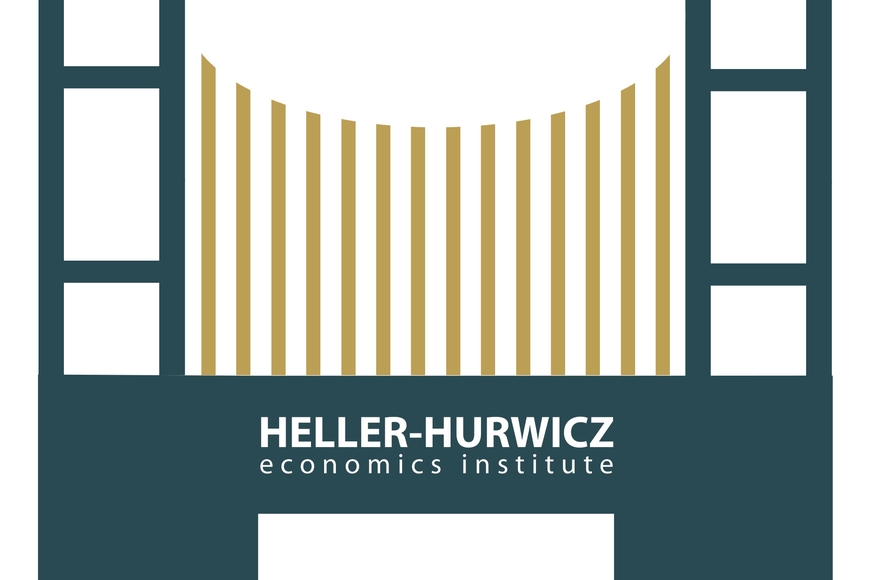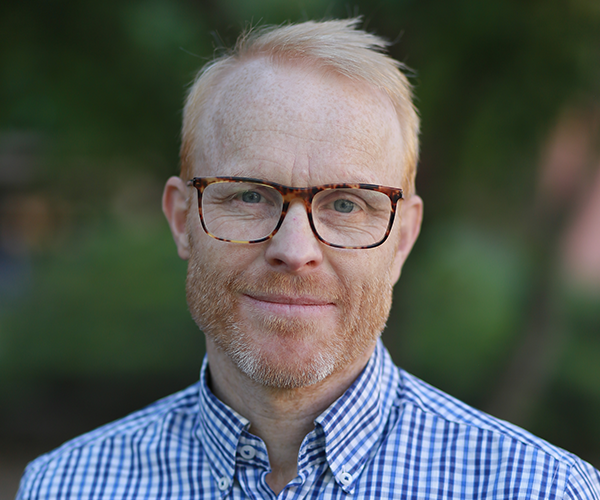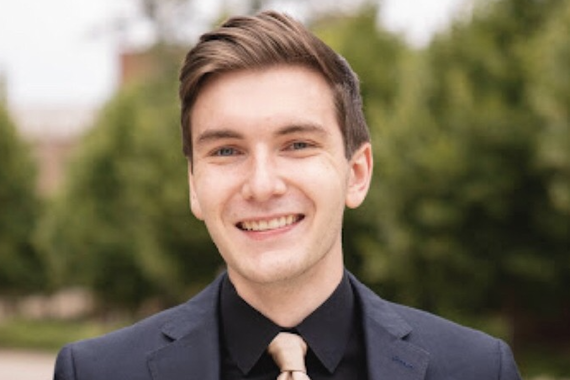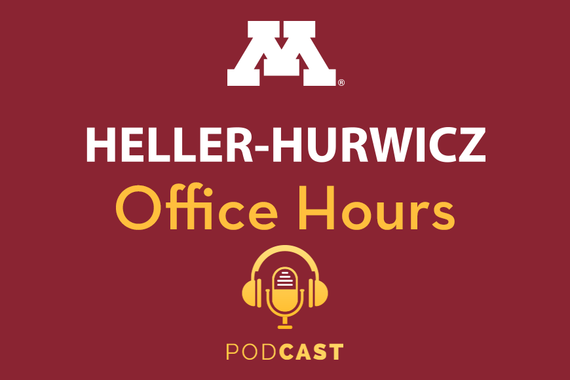2023 HHEI Annual Report
Letter from the Director
Dear friends,
As we reflect back on what we've achieved, I'm excited to be in my second year as director of the Heller-Hurwicz Economics Institute. It’s thanks to the vision of the advisory board, previous directors, friends like you, and others committed to rigorous economic research and policy that we have been able to accomplish all that we have in the last year.
Heller-Hurwicz Economics Institute’s vision is to build a bridge between the expertise of our two namesakes: critical economic research in honor of Leo Hurwicz, and good, research-based public policy in honor of Walter Heller.
In 2022-23, we invested in these pillars— research and policy—and strengthened the bridge connecting the pillars. To name some of our impacts—we invested over $145,000 in research conducted by top and rising economics faculty, allowing them to train and invest in graduate research assistants. Heller-Hurwicz Economics Institute created the space for policy debates, including roundtable events about the U.S. debt ceiling and the trade-offs of increasing the minimum wage, based on data collected right here in Minneapolis and St. Paul. We also joined the world of podcasting by launching Office Hours, a 13-episode podcast series highlighting research done by Minnesota economists.
I’m grateful for the support of advisory board members, policy and research partners, our undergraduate and graduate students, faculty, and an engaged public. Heller-Hurwicz Economics Institute - and the economic research and policy implications within that research - is stronger, more rigorous, and more visible thanks to the people like you that we are lucky enough to call our friends.
Thank you,
Kjetil Storesletten
Mary A. and Robert B. Litterman Endowed Director, Heller-Hurwicz Economics Institute & the Beverly and Richard Fink Professor in Economics
Follow the links below for highlights from our annual report.
Click here for a printable version of the HHEI Annual Report.
We’re all familiar with monopolies - when one firm dominates supply. But what happens when one large employer dominates the labor market, or a so-called monopsony?
Over the last few years, Kyle Herkenhoff, a three-time recipient of a Heller-Hurwicz Economics Institute research grant, has been researching monopsonies and the impact of mergers on the labor market. Herkenhoff says, “When a two-firm town turns into a one-firm town because of a merger, monopsony power intensifies, wages are further depressed and workers are harmed.”
This year, Herkenhoff and his collaborators have fallen into a sweet spot of novel research and timely policy relevance, including the ability to comment on proposed Federal Trade Commission and Department of Justice guidelines governing mergers. The FTC and DOJ have issued Draft Merger Guidelines, intended to tighten up regulations on when a merger would harm workers through the reduction of competition in the labor market. Herkenhoff’s model of labor market competitiveness assessed worker welfare implications of the current guidelines, as well as tighter thresholds in the labor market. “It’s harder to switch employers than it is to switch laundry detergent brands,” says Herkenhoff. Herkenhoff’s research suggests that lowering the merger threshold by 40% would improve worker welfare through higher wages.
Herkenhoff, along with his co-authors, presented at a joint FTC and DOJ conference, hosted by the University of Chicago Law, about the merger guidelines and their recommendations. They recommended lowering merger thresholds, and the proposed threshold is an improvement over the looser guidelines. Herkenhoff said, “A lot of people look at the firm sales-side when evaluating mergers, but there aren't many people looking at it from the labor market-side.”
The FTC and DOJ guidelines will be finalized in spring 2024. Herkenhoff says, “These guidelines are highly anticipated. They’ll change the competitive landscape of mergers and acquisitions in the United States for years to come.”
In 2022-2023, Heller-Hurwicz Economics Institute was awarded three research grants to University of Minnesota Economics faculty:
Anmol Bhandari, On the Nature of Self Employment
David Rahman, Individual Differences and Collective Outcomes
Joseph Mullins, A Structural Meta-Analysis of Welfare Reform Experiments and Their Impacts on Children
We also provided research assistance to Aldo Rustichini to access biodata sources from the UK Biobank, and Ellen McGrattan to support her research with the Internal Revenue Service administrative data.
In the midst of a natural experiment on raising the minimum wage, University of Minnesota and Federal Reserve Bank of Minneapolis economists are collaborating on a multi-year impact evaluation.
Both Minneapolis and Saint Paul enacted step-up minimum wage policies with the goal of bringing the minimum wage to $15 per hour in 2022 and 2027, respectively. This process creates an experimental environment for researchers to analyze each phase of the increase and what impacts the increased wage have on wages, hours worked, earnings, and overall job numbers.
In the 2023 Economic Impact Reports, University of Minnesota Economics professors Loukas Karabarbounis and Jeremy Lise, and Federal Reserve Bank of Minneapolis economist and HHEI research affiliate Anusha Nath, find that an increase in the minimum wage results in higher wages and lower employment. The study used a time series analysis (before and after a policy was enacted), cross-section analysis of establishments (comparing payrolls between employers across all industries), and a cross-section analysis of workers (comparing at an individual worker level, including if an individual changed jobs). So far, the change in minimum wage has produced fewer jobs for workers, but those employees earned a higher hourly wage. As Anusha Nath puts it, “If there are large minimum wage changes, it comes at a cost, and who bears the cost? It's the businesses and workers who are [closer to the minimum wage].”
In May 2023, Heller-Hurwicz Economics Institute hosted a roundtable on the minimum wage during a two day series of events in collaboration with the Minnesota Economics Big Data Institute and Federal Reserve Bank of Minneapolis. Kjetil Storesletten, director of Heller-Hurwicz Economics Institute, said, “These events showcase the power of Minnesota Economics: rigorous research conducted by world-class economists that influences policy decisions now and in years to come.”
The focus of the Heller-Hurwicz Economics Institute’s work this year was to strengthen the bridge connecting economists, policymakers, and the public.
We did this by continuing to create programming that applies a policy lens to contemporary economic research. Our events and outreach initiatives are designed for people who have an interest in policy and strong economic research including policy makers, business leaders, and academics, and cover a range of topics from education, to climate change, and fiscal policy. The bridge between economic research and public policy is built through sharing information. In demystifying economists’ role in answering key policy questions, our roundtable discussions, podcasts, and webinars allow more people to access, understand, and debate the important economic and policy questions of our time. Combined, these efforts brought relevant economic research to thousands of people last year.
Highlights of the 2022-2023 programming calendar include:
Launching the Heller-Hurwicz Office Hours podcast;
Banking and fiscal policy events that provide context and depth to current events, such as the Silicon Valley Bank crisis and debt ceiling debate;
Debating the economic and climate impacts of a global carbon tax.
Office Hours podcast
Launched in April 2023, Season One of the Heller-Hurwicz Office Hours podcast marked a fresh approach to external communications and outreach methodologies for the Heller-Hurwicz Economics Institute. Each episode features a different University of Minnesota economist and their research. By offering 15-20 minute educational content on a range of topics from aging, to wage bargaining, international trade, and more, our inaugural season attracted strong listenership, including among the young professional demographic.
According to Office Hours host and MPR economics commentator Chris Farrell, “We’re all amateur economists at work and meeting with friends over dinner, talking about jobs and wages, strategies for savings and paying off debts, and trying to understand the costs and rewards of attending college. Economists also struggle with some of society’s most pressing issues, such as how best to boost the living standards of families to navigate the inevitable trade-offs from international trade. Yet the language and research techniques of modern economics often seems far removed from these everyday concerns and policy debates. The Office Hours podcast gets economists associated with the Heller Hurwicz Economics Institute to discuss their research and their insights in accessible and enlightening conversations.”
Banking and Fiscal Policy in the News
In response to current events around banking and fiscal policy and drawing on our significant expertise in monetary policy and banking regulations, Heller-Hurwicz Economics Institute hosted two policy discussions that events garnered significant attendance and audience participation:
Here we go again? Silicon Valley Bank and the current banking crisis
The recent failures of Silicon Valley Bank, Sovereign Bank, and internationally, Credit Suisse, brought new focus on the role of central banks in regulating and ensuring the stability of our financial system. In this conversation, Federal Reserve Bank of Minneapolis Vice President and Senior Economist Terry Fitzgerald, and University of Minnesota professors V.V. Chari and Chris Phelan, discussed the current banking crisis and what policies need to change going forward.
U.S. Debt Ceiling: Reining in the Leviathan or Mutually Assured Destruction?
Raise the debt ceiling or pay the bills? University of Minnesota professor Chris Phelan, and Federal Reserve Bank of Minneapolis monetary advisory Marco Bassetto and Assistant Director of Policy and monetary advisor Cristina Arellano discussed the looming debt limit deadline, and what the risk of default may mean for the US economy.
An economic solution to the climate crisis
With the goal of influencing real world economic policy decisions that promote the public good, economic research related to climate change has remained a pillar of HHEI programming.
Scientists agree: global warming is the result of CO2 produced by human activity, and urgent action is needed to reduce carbon dioxide emissions. In September 2022, economist Per Krusell PhD ‘92, Professor at the Institute for Economic Studies at Stockholm University, shared his research on carbon tax and potential policy solutions in the distinguished lecture on Climate Policy and Economics. What isn't clear is how this should be done in a global market economy. Fortunately, economic analysis can be used to figure out what policies have the best chance of success, given economic and political realities.
Grace Brang, BS '18 HHEI undergraduate research assistant
Can you tell me a bit about your career path?
Postgrad, I moved out to DC to start a job at the Federal Reserve Board of Governors. I ended up taking a job as an analyst with the Federal Reserve and was even able to work on the Fed’s emergency lending to support the financial system during the pandemic. Then just as things were starting to settle down, I was asked to join the Treasury Department for a temporary assignment in March of 2021 to help implement the American Rescue Plan. After that, I returned to the Fed and my current analyst role in the division of Financial Stability. I’ll hit my 5 year mark at the Fed next summer.
Is there anything you did as an undergrad that really helped prepare you for life after college?
[One] thing that helped me a lot was being surrounded by people that I thought were smarter than me. In all of my classes, I really had to work hard to meet the bar and keep up with my peers because the caliber of students in the econ program was very high. I felt very comfortable starting work because it was just a continuation of all the hard work I was doing the whole time as a student. I know I’m never the smartest one in the room, which is a feeling I’ve gotten really comfortable with throughout college and now in my recent working years.
Read Grace's full profile here.
Tobey Kass, PhD '22 HHEI graduate research assistant
Your research looks at the impact of expanding unemployment to contingent workers. What did you find in your study, and what would
you recommend policymakers consider when assessing laws that impact the gig economy?
Using the model in my research, I found that the recent technological development of apps that have made it easier to find contingent work has lowered the need for unemployment in the economy in an aggregate sense because anyone experiencing a spell of unemployment may be able to use an
app on their phone to sell their skills in the contingent labor market. I also found that expanding unemployment insurance to contingent workers could be costly for society. When unemployment insurance encompasses contingent workers, individuals who could easily find contingent work may instead take an unemployment insurance payment, causing an increase in the number of people on unemployment. As a result of this dynamic, unemployment
insurance costs increase, and taxes would need to increase to cover the expenses.
Heller-Hurwicz Economics Institute invests deeply in the economists and faculty producing world-class research, the strategies bridging research and policy, and the students who work side-by-side with our faculty and will be the next generation of economic research.
During this ten-year campaign, our goal is to raise $25 million for the following priorities:
Advance innovative research by attracting top-tier economists, funding their most innovative and bold research, and encouraging intellectual exchange among these competitive and high-achieving thinkers.
Transform research into policy by building on a robust level of communication with legislators and the public, growing research-driven programming and forums, and driving advocacy work
Fuel tomorrow’s change-makers through graduate fellowships, undergraduate scholarships, and pre- and post-doctorate awards.
We’ve raised over $8 million towards our $25 million goal since the campaign started in 2021 and the newly created professorships and research awards are making a difference. In the last job market cycle, we maintained a competitive edge within the economics job market and retained five faculty members who were enticed with attractive offers from other top programs around the country.
Thanks to gifts from alumni and friends to honor Professor Anne Krueger, Manuel Amador, one of our most talented professors studying international economics and a top candidate at other highly ranked universities, chose to stay at the University of Minnesota because of the resources offered by the Anne Krueger Professorship. Manuel said, "Receiving this professorship will allow me to continue my research on international macroeconomics, in areas where Anne Krueger herself made path breaking contributions. Her work had a deep impact on me when I was starting studying economics. And I would have never imagined that I would be awarded a professorship bearing her name. I am very honored."
Tom Holmes, professor and department chair adds, “Manuel is an absolute star and it is fantastic we were able to retain him. Manuel’s combined record of research, teaching, and department and profession service make him the type of professor especially deserving of this recognition. Along with my colleagues in the department, we offer our heartfelt congratulations to Manuel, and special thanks to the many alumni and friends who created this Professorship to honor Anne.”
You can’t find a better ROI than this one: $8-to-$1.
It’s not a risky investment vehicle or crypto, but early childhood education. Since our founding ten years ago, HHEI has followed the research on early childhood education investments, including hosting roundtables on early learning, and turning research into early childhood policy. For twenty years, Art Rolnick (PhD ‘73), former senior vice president and director of research for the Federal Reserve Bank of Minneapolis and Heller-Hurwicz Economics Institute advisory board member, has advocated for strong early childhood education programs as both a social good and an economic driver. According to Art, “Most of that [$8-to-$1] return... is public. There’s clearly some private benefits to the child, but there are public benefits in terms of reduction in crime [and] lowering the cost of schools, so it was a high public return.”
This year, Minnesota legislators agreed with Rolnick. In the 2023 session, the Minnesota Legislature approved over $750 million in new funding for early childhood education and child care—a major investment in Minnesota’s youngest learners.
Heller-Hurwicz Economics Institute thanks our Advisory Board:
Julie Bunn, Rae Carter, Christine Cumming (BA ‘74, PhD ‘83), Jessica Donohue (MA ‘98, PhD ‘01), Ed Foster, Carla Haugen (BA ‘76), Van Hawn, Tom Holmes, Zenas Hutcheson, Bob Litterman (PhD ‘80), Andreu Mas-Colell (‘72 PhD), Ellen McGrattan, Jose Peris (‘82 PhD), Norm Rickeman (BA ‘71), Bob Rinek, Art Rolnick (PhD ‘73), Rüşdü Saraçoglu (PhD ‘80), Tom Sargent, Lowell Schwab, Mark Schulze, Gary Stern, Interim Dean Ann Waltner, Kurt Winkelmann (PhD ‘87), chair.




